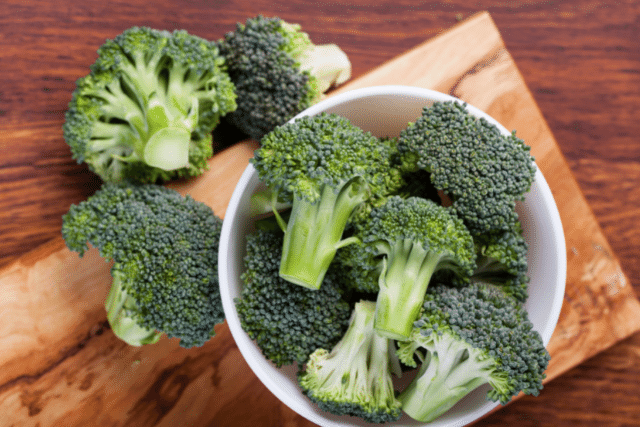Recent Posts
-

- Diabetes-Friendly Nutrition: Smart... 08.12.2024
-

- Nutrition for Chronic... 08.12.2024
-

- Anti-Inflammatory Diet: Food... 08.12.2024
-

- Low-Sodium and Heart-Healthy:... 08.12.2024
-

- Plant-Based Diets for... 08.12.2024
Organic Broccoli 101: Nutrition Facts and Health Benefits

In many commercials and movies, it is always portrayed that broccoli is something that shouldn’t be digested as their reactions when eating it shows disgust, but these vegetables have a lot more to prove.
Broccoli is a cruciferous vegetable with kale, cauliflower, Brussels sprouts, bok choy, cabbage, collard greens, rutabaga, and turnips. This green vegetable almost looks like a mushroom with a round head and an elongated stem.
According to popular belief, broccoli is considered a superfood. Vitamins, minerals, and antioxidants are abundant in this low-calorie food. Not just that, there is more nutrition that we can get from these vegetables. Read this article to learn more!
In terms of its nutritional profile, raw broccoli has roughly 90 percent water, 7 percent carbohydrates, 3 percent protein, and almost little fat. Additionally, each cup of it has only 31 calories.
Fiber and sugars make up the bulk of Broccoli's carbohydrate content. In addition to fructose and glucose, there is a minor amount of lactose and maltose in the sugars. However, there are just 3.5 grams of digestible carbohydrates in a cup of this product.
A well-balanced diet should include enough fiber. It may boost intestinal health, avoid numerous ailments, and aid in weight reduction. About 5–10% of the RDA is provided by one cup of raw broccoli, with 2.3 grams of fiber per serving.
For development and maintenance, protein is a vital component of the human body. Broccoli has a higher protein content than other vegetables, with 29% of its dry weight coming from protein.
Broccoli is a good source of the following vitamins and minerals:
- Vitamin C.
This vitamin, high in antioxidants, is essential for a healthy immune system and skin.
- Vitamin K1.
Vitamin K1 is essential for blood clotting and bone health and is found in high concentrations in broccoli.
Folate is essential for healthy tissue development and cell function in all people, but it is especially critical for pregnant women.
Potassium, an essential element, is suitable for controlling blood pressure and preventing heart disease.
Whole grains, legumes, fruits, and vegetables are rich sources of this trace element.
And were not done; besides the nutrients in broccoli, here are the health benefits you can get from eating it.
Prevention of Cancer
Oxidative stress has been related to the fast proliferation of aberrant cells in cancer. Compounds abundant in broccoli are thought to have cancer prevention benefits.
Many cancers, including lung, colorectal, breast, prostate, pancreatic, and stomach cancers, may be lowered by eating cruciferous vegetables, such as broccoli.
Even though broccoli supplements are available, they may not provide the same quantity of isothiocyanates (which fight the growth and development of cancer) as full, fresh broccoli and, thus, may not provide the same health advantages.
Reduced Cholesterol levels
Cholesterol serves a variety of purposes throughout your body. Bile acids, which aid in fat digestion, are produced largely because of it. The bile acids in your intestines are bound to substances in broccoli, which causes them to be excreted and prevents them from being re-used.
As a result of this impact, heart disease and cancer risks have been lowered. Steamed broccoli, one research found, is especially effective in lowering cholesterol.
Optical health
One of the most prevalent side effects of growing older is deteriorating vision. Lutein and zeaxanthin, two of broccoli's most important carotenoids, have been linked to a reduced risk of age-related eye problems.
Reversing night blindness caused by a deficit in vitamin A is possible. Broccoli is rich in vitamins and minerals.
Sources:
https://www.medicalnewstoday.com/articles/266765
https://www.healthline.com/nutrition/foods/broccoli#vitamins-and-minerals





